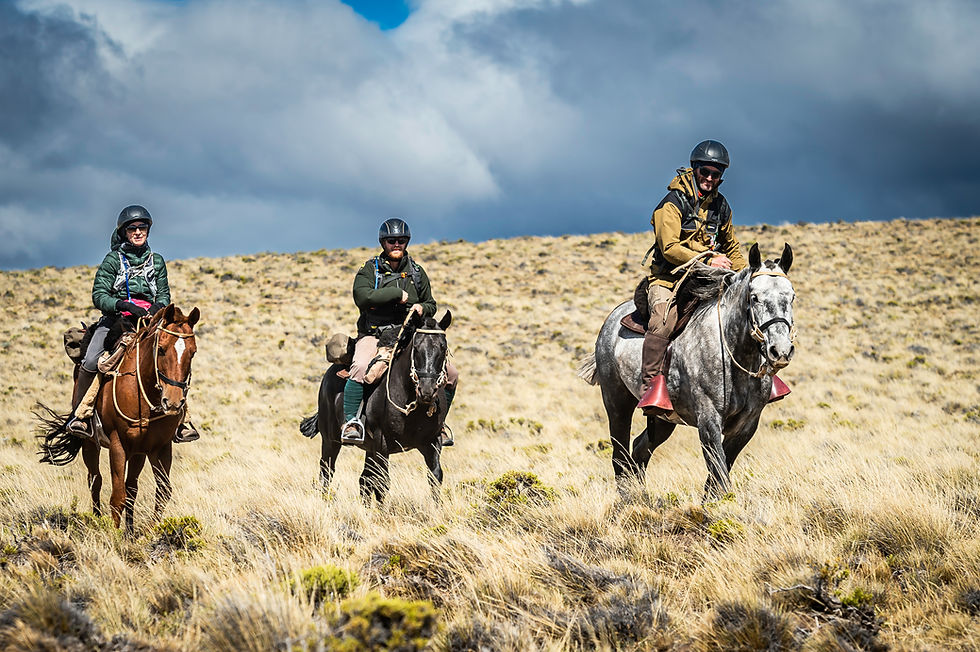Gaucho Derby - Day 5
- For Rangers
- Apr 2, 2022
- 3 min read
Words: Sam Taylor
Images: Richard Dunwoody
We had been held back this morning, partly due to the race hold and partly due to the deviation via Brazil the previous day, which had added a whopping three hours between us and the next group.
Poncho, Alejandro and Charlotte made the most of the race hold by being hungover. I spent it going cold turkey from Paracetamol and in a state of anxiety about whether or not my horse would be my friend. Jako, by extolling the virtues of being alive, and Antoine, being a French vegan, was probably asking himself some searching questions about his lifestyle choices. I didn't see Simon, as he was delivering tea to everyone in bed.
Happily, I drew another super horse. An Arab cross that I named Lawrence on account of him having a little bit of Arab in him. Charlotte drew an Arab mare that was equally cool, named #285 because she was too hungover to bother with an imagination.

It was not ideal to have a race hold and some Malbec simultaneously; the next leg would be tough into the "Plateau of Death" - a barren wasteland high in the mountains, which, when not covered in sharp rocks, was covered in rock bogs.
Our little gang saddled up and left in the sunshine until we reached sheer scree slopes. As with Jakob's horses, ours skipped up and down the other side. We were followed by condors, circling us in whatever thermals they found in the rarified air.
We descended a steep valley and were making our way towards the first vet check. As we approached, one of the vets ran out.
"You'll need to dismount here and walk your horses beyond the vet check. There's been an accident, and a chopper is expected". There was a tone in her voice that suddenly changed the mood. Something serious had happened, and instantly the jovial mood from the morning vanished.
We did as we were asked, catching the group ahead who had been present when the incident had occurred. They, clearly quite shocked, relayed the incident to us.
Daniel, a very competent Dutch rider, had, whilst getting back on, been kicked in the chest and the temple. It turned out his helmet had almost certainly saved his life. We, however, did not know this, as while he had regained consciousness, the potential injuries looked very grave indeed.
Poncho remained as an interpreter for the Argentinian ambulance service, which arrived by military helicopter. As instructed, we proceeded to a midpoint where vet crew were stationed some 10km further on.
There had also been another near miss that day. Brenda, a cheerful American rider had been bucked off going down a steep hill. She was thrown forward from the saddle, head first into a boulder. She had a badly smashed nose and was dazed, but thankfully she would be OK.

We kept together as a large group, but the mood was different now. People were exchanging worried looks and the fear for Daniel’s wellbeing was tangible, as well as concern for Brenda, who had been badly shaken up. The spirit of adventure was temporarily lost, and the condors now seemed less majestic and more forbidding as we set off. Having heard the description and seen the agitated look (despite the outward calm) on the vet's face, I must admit I feared the worst. We had also left behind Poncho - one of us - and we were unsure when we might catch up with him again. It was less important, but his absence made the mood even more sombre.
I was brushing my teeth in a stream when I noticed a dog running up the valley. It was an odd sight as we were indeed in the middle of nowhere. But it was a dog - I'd been sparing with the painkillers that day.
And then, behind the dog came gauchos, charging in with Poncho in their midst, leading a horse alongside Toby, the head medic. It was a surreal sight in the twilight but an incredibly uplifting one. They brought the welcoming news, "Daniel was stable." The plainest and blandest of sentences. But perhaps the most uplifting words we'd heard all week.
The mood changed. We had Poncho back, and Daniel was stable! We climbed into our sleeping bags and were optimistic about the next day.
The team raised over $60,000 to support life and health insurance, emergency rations and welfare support to over 2000 rangers across Africa. The effects of the Covid-19 pandemic continue to be felt. Rangers have seen jobs lost, resources slashed, and livelihoods destroyed. All the while, they remain steadfast in protecting what is left of our wilderness. They need our help. Please support them.
or if you'd like to support through a 501 C.3:

What an intense and emotional journey! The resilience of the riders and the unwavering spirit of adventure, even in the face of danger, is truly inspiring. Glad to hear that Daniel was stable and that the team pushed forward together. Just like in the Gaucho Derby, teamwork and endurance define champions—whether on horseback or representing your squad in style with a Charlotte Hornets Leather Jacket. True team Leather Jackets energy right here